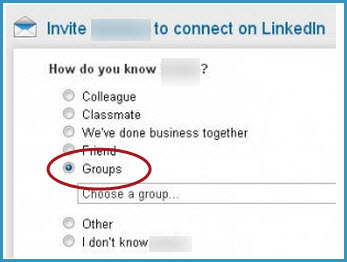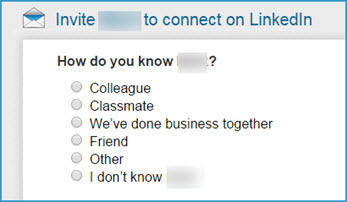 One person’s networking is another person’s spam.
One person’s networking is another person’s spam.
The LinkedIn networking debate strikes at the core of that dichotomy.
What is the LinkedIn networking debate?
It starts with LinkedIn’s own User Agreement and its Dos and Don’ts section.
“Don’t undertake the following: 5. Invite people you do not know to join your network.” LinkedIn’s Dos and Dont’s
LinkedIn Networking Debate
Thanks to LinkedIn connection, Fred Pilot of Pilot Healthcare Strategies, who shared a post complaining about a change in invitations to connect.
In the past, if you wanted to connect with someone who participates in one of your Groups, you could indicate “Groups” as the way you knew that person.
LinkedIn (perhaps inadvertently) removed the “Groups” selection as an option from how you know the member.
Your Previous Options
Your Current Options
One commenter said LinkedIn told him that it was a bug and LinkedIn is working on it. An update from the post’s author confirms LinkedIn gave him the same response but with no timeline for completion.
Do we have a LinkedIngate?
The member’s post brought to mind an ongoing debate on how we define networking and “knowing” someone.
- Some members play the numbers game in connections
- Others firmly support the invite who you know philosophy
- The rest are probably somewhere between the two
Making Connections
The above-mentioned post was written by someone who designates himself as a LION member.
I did not know what that meant until I joined a LinkedIn community on Google+.
- LION is an acronym for LinkedIn Open Networker
- The LION member agrees to connect with anyone
- Or if for some reason they don’t, they agree not to use the IDK (I don’t know) this person
If a member receives too many IDKs, the social media platform may restrict invitations to only those submitted with the invitation recipient’s email address.
As a designated LION, it is not surprising the author of the article is not happy with LinkedIn’s latest (intentional or unintentional) change.
- LinkedIn purists hate the numbers game
- They believe in building a business relationship before sending an invitation to connect
Although I think even the purist would agree that interacting in Group discussions with another member should qualify for connection. It’s how I met Fred who sent me the link to the post.
The debate is in how you connect.
The Machine Gun Approach
The machine gun approach to connecting sprays invitations, hoping to hit as many as possible.
The method is often masked by a tiny checkmark in a box, authorizing the release of canned invitations.
LinkedIn is guilty of this approach.
- The platform encourages you to upload address books
- Once you do, the platform puts a checkmark by each entry’s name
- If you do not uncheck them and proceed, email invitations are sent to everyone
- And annoying follow-up emails
Other services have a similar tactic.
A few years ago, I wrote a post on my personal blog about Referral Key, marketing itself as a business network referral tool.
That post, highlighting my embarrassment at the bombardment of emails to my LinkedIn connections, continues to receive my highest traffic.
Having learned my lesson from the Referral Key incident, I made sure to check out a site that a LinkedIn connection sent to me.
A Google search of Skillpages brings up several links to claims of spamming email contacts.
- No thank you
- Lesson learned
Connect and Attack
I am selective about my LinkedIn connections. I have several that came from Group discussions.
Sometimes the connection backfires.
- Like those who upon connecting immediately fill your Inbox with sales pitches
- Or ask you to share your connections’ information – uh, no
It boggles my mind how people view this as a smart approach.
Getting to Know You
It occurs to me that this great LinkedIn networking debate is similar to the great Guest Post debate.
Guest posters use similar methods.
- Machine gun spray of canned requests
- No effort to get to know the blog owner or the topics covered
Different strokes for different folks.
What’s your view on networking?
- Do increased numbers mean increased chances?
- Or does selective networking reap greater benefits?
=====================
Helping you Keep it simple, clear & uniquely yours – contact me for help with your business writing needs.
=====================



I get about 10 requests a week from folks I don’t know- and have no clue what their business does. I think you just explained to me how I am getting them. (I prefer to know those with whom I network. Especially when dealing in the the ethereal world!)
I’m with you there, Roy. I don’t often get requests from total strangers in LI but it does happen. What really cracks me up is when someone does an Endorsement for me and they have never worked with me. 🙂
Don’t you love it when someone endorses you for something you don’t even do? A couple people have tried to endorse me for advertising – Don Draper and Peggy Olson have nothing to worry about from me.
LOL! I know the feeling, Paula. Someone endorsed me as a dentist. 😀 A dental hygienist in a former life – but never a hygienist!
A dentist? I’ve now heard it all – at least when it comes to LinkedIn Endorsements, anyway.
When I first joined LinkedIn, I’d accept requests from almost anyone. Then I realized I had no reasons to be connected with some of them. Now, I’m much more selective. Either I have to know the person – using a broad definition of “know” – or be in the same general business or line of work.
Personally, I assume most of the 500+ “Lion” types (are they still called Lions?) are more concerned with the quantity, not quality, of their contacts.
Yes, Paula, LION is still being used. Like I said in the post, I had no idea what that was until I heard from other members. In the old days when Groups were much better than they are now, I used to routinely connect with people with similar interests or in my niche. Now, I rarely visit Groups. Sad really. 🙁